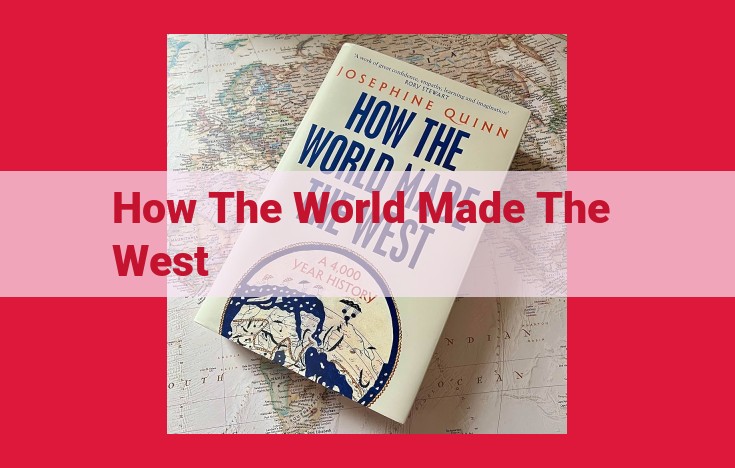The rise of the West was shaped by a complex interplay of intellectual, cultural, technological, economic, political, and geographical factors. From the Renaissance to the Scientific Revolution, the West embraced new ideas and innovations, fostering advancements in science, technology, and industry. Economic factors, including trade and colonialism, drove economic growth and spurred technological progress. The development of democratic institutions and the rise of nationalism fueled political and social transformations, while influential individuals left lasting impacts on Western thought and history. Geographical influences, including the proximity of Europe to Asia and Africa, facilitated cultural exchange and shaped the development of Western civilization.
Intellectual and Cultural Foundations of the West
The West’s ascendancy to global prominence can be traced to a tapestry of intellectual and cultural movements that sparked a transformative era. These movements, like threads in a grand tapestry, interweaved to create the foundations upon which Western civilization flourished.
The Renaissance, emerging from the depths of the Middle Ages, ignited a rebirth of learning and a keen interest in classical antiquity. It rekindled the flame of humanism, placing man at the center of intellectual inquiry. Artists and scientists soared to new heights, inspired by the rediscovery of ancient knowledge. Names like Leonardo da Vinci and Nicolaus Copernicus became synonymous with the era’s brilliance.
The Enlightenment that followed carried this torch forward, embracing reason and empiricism. Philosophers like John Locke and Voltaire challenged traditional beliefs, advocating for individual rights and a government based on rational thought. The emphasis on scientific observation and experimentation paved the way for the Scientific Revolution.
This paradigm shift in scientific inquiry, led by pioneers such as Isaac Newton, marked the dawn of a new age. It shattered long-held misconceptions, revealing the laws of nature and the workings of the physical world. These intellectual revolutions laid the groundwork for the West’s unparalleled technological advancements and scientific prowess.
Technological Advancements: The Driving Force Behind Western Progress
Technology has played an indispensable role in shaping the trajectory of Western civilization. From the humble origins of the printing press to the transformative power of the computer, technological innovations have ignited a chain reaction of progress that has propelled the West to unprecedented heights.
The Gutenberg Revolution: Unlocking the Power of Knowledge
In the 15th century, the printing press emerged as a catalyst for intellectual resurgence. By reproducing books, pamphlets, and other written works on a mass scale, it democratized knowledge, breaking the shackles that previously confined learning to an elite few. This proliferation of ideas fueled the Renaissance and Reformation, sparking a profound shift in Western thought and society.
Steam Power: Industrializing the World
The steam engine of the 18th century revolutionized manufacturing and transportation. Factories equipped with steam-powered machinery churned out goods at an unprecedented rate, transforming economies and creating countless new jobs. Steam-powered ships opened up new trade routes, connecting the West to distant lands and facilitating the exchange of goods and cultures.
Instantaneous Communication: The Telegraph and Beyond
The telegraph, invented in the 19th century, shrank the world, enabling instantaneous communication across vast distances. News, information, and ideas could now travel with lightning speed, fostering global connections and accelerating the pace of progress. The subsequent development of the telephone, radio, and internet further expanded the reach of human communication.
The Digital Revolution: Shaping the 21st Century
The computer has emerged as the defining technology of the 21st century. Its ability to store, process, and transmit vast amounts of information has fueled advancements in fields as diverse as medicine, education, and finance. The internet, a network of interconnected computers, has created a global village, blurring geographical boundaries and facilitating the exchange of ideas, knowledge, and commerce.
Technological progress has been an integral part of the Western story. From the transformative power of the printing press to the relentless innovation of the digital age, technology has consistently pushed the boundaries of human knowledge and capability. As the West continues to embrace new technologies, we can expect even greater advancements that will shape our future in untold ways.
Economic Factors: The Fuel of Western Progress
Trade and economic factors played a colossal role in shaping the course of Western civilization.
The Spice Trade: Global Network
The allure of exotic spices from the East sparked a lucrative trade network that connected Europe to Asia. The quest for nutmeg, cloves, and pepper stimulated exploration, fostering cultural exchange and scientific advancements.
The Transatlantic Slave Trade: A Dark Chapter
The abhorrent transatlantic slave trade provided cheap labor for Western colonies. The wealth accumulated from this inhumane practice fueled industrialization and economic growth. However, it left an enduring stain on Western history.
Colonialism: Expansion and Exploitation
Western powers embarked on a relentless quest for global dominance. They established colonies, exploiting natural resources and establishing markets, which boosted their economies. However, colonialism also created legacies of conflict and inequality.
Industrialization: The Engine of Progress
Technological innovations, such as the steam engine, mechanized production, and mass manufacturing, fueled a period of unprecedented economic growth. Industrialization transformed societies, creating new industries and job opportunities. It also laid the foundation for modern economic development.
Interdependence and Globalization
Western economies became increasingly interconnected. International trade and investment fostered interdependence, creating a globalized economy. While globalization offers opportunities, it also poses challenges, such as income inequality and the widening gap between rich and poor.
By unraveling the complex tapestry of economic factors that shaped the West, we gain a profound understanding of the forces that continue to drive our world today.
Political and Social Structures in the Western World
The evolution of political and social structures in the West has played a pivotal role in shaping its destiny. From the rise of democracy to the era of nationalism, the West has undergone a transformative journey that has left an indelible mark on the world.
The ancient Greek city-states laid the foundations for democracy, with its emphasis on citizen participation and the rule of law. In the Middle Ages, feudalism dominated Europe, creating a rigid class system and a decentralized political landscape. However, the Magna Carta in 1215 signaled a shift towards greater individual rights and constitutional constraints on monarchy.
The Renaissance and Reformation witnessed a renewed interest in humanism and rationalism, which challenged traditional authority and paved the way for the Scientific Revolution. These intellectual currents fostered a spirit of inquiry and a desire for progress, leading to groundbreaking discoveries and technological advancements.
The 18th century Enlightenment further propelled the West towards democracy and egalitarianism. Philosophers like John Locke and Jean-Jacques Rousseau advocated for natural rights, popular sovereignty, and separation of powers. These ideas inspired revolutions in America and France, which established democratic republics and spread the ideals of liberty and equality throughout the world.
In the 19th century, nationalism emerged as a powerful force, fostering a sense of collective identity and territorial unity. Napoleon’s conquests sparked a wave of patriotic movements across Europe, leading to the formation of new nation-states. This period also saw the rise of industrialization and capitalism, which transformed economies, societies, and the balance of power between nations.
The 20th century witnessed the spread of globalization, as advances in transportation and communication brought people from different parts of the world closer together. International organizations like the United Nations emerged to promote cooperation and prevent conflicts. However, this century was also marked by totalitarian regimes and global wars, which challenged the foundations of Western democracy and human rights.
Today, the West continues to grapple with the challenges and opportunities of a globalized world. Political and social structures are constantly evolving, as societies adapt to new technologies, economic shifts, and demographic changes. The rise of the internet and social media has empowered citizens and challenged traditional institutions, while globalization has created both opportunities and vulnerabilities for Western nations.
Understanding the historical evolution of political and social structures in the West is essential for comprehending the roots of its current political systems, social institutions, and cultural values. By unraveling this complex journey, we gain a deeper appreciation for the foundations of Western civilization and its impact on the world.
Influential Figures in the Shaping of the West
Throughout history, a constellation of brilliant minds and visionary leaders have left an indelible mark on the development of Western civilization. Their ideas, discoveries, and actions have shaped the world we live in today.
Isaac Newton: The Father of Modern Science
- Sir Isaac Newton, the enigmatic English physicist, mathematician, and astronomer, revolutionized our understanding of the natural world.
- His groundbreaking contributions to classical mechanics, optics, and calculus laid the foundation for modern science.
- Newton’s laws of motion and gravitation became the cornerstone of scientific thought, transforming our comprehension of the universe.
Charles Darwin: The Pioneer of Evolutionary Theory
- Charles Darwin, the British naturalist, geologist, and biologist, forever altered our perception of life on Earth.
- His seminal work “On the Origin of Species” introduced the theory of evolution by natural selection, explaining the diversity and adaptation of species.
- Darwin’s transformative ideas shook the foundations of traditional religious beliefs and influenced countless fields, from biology to sociology.
Karl Marx: The Revolutionary Theorist
- Karl Marx, the German philosopher and economist, provided a profound critique of capitalism and its social consequences.
- His theories on class struggle, surplus value, and historical materialism profoundly influenced political and economic thought.
- Marx’s ideas laid the groundwork for socialist and communist movements worldwide, leaving a lasting impact on the development of modern societies.
Mahatma Gandhi: The Apostle of Nonviolence
- Mohandas Gandhi, affectionately known as Mahatma (“Great Soul”), was an Indian lawyer, anti-colonial nationalist, and spiritual leader.
- Gandhi’s philosophy of *ahimsa*, or nonviolence, became a powerful force in India’s struggle for independence from British rule.
- His teachings and actions inspired countless civil rights movements around the globe, advocating for equality, justice, and peace.
Geographical Influence on Western Development: A Tapestry of Cultural Exchange
The rise of the West cannot be fully understood without acknowledging the profound impact of geography. The continents, seas, and climate have shaped Western civilization, fostering cultural exchange, innovation, and global influence.
Europe: The Cradle of Civilization
Europe, a peninsula nestled between the Atlantic Ocean and the Mediterranean Sea, has been a melting pot of ideas since ancient times. Its Mediterranean climate, fertile soil, and access to trade routes allowed civilizations like Greece and Rome to flourish. The Renaissance and the Scientific Revolution later emerged in these lands, igniting a new era of intellectual and technological advancement.
Asia: Encounters and Innovations
Asia has played a vital role in shaping Western culture. Ancient China was a hub of technological wonders, such as papermaking, gunpowder, and the compass. India‘s spiritual traditions, including Buddhism, and Hinduism, influenced Western philosophy. The Silk Road, a network of trade routes spanning from China to Europe, facilitated cultural exchange and the spread of ideas.
Africa: Crossroads of Civilizations
Africa has been a crossroads of civilizations for centuries. Ancient Egypt was renowned for its architectural marvels, including the pyramids. Sub-Saharan Africa produced rich and diverse kingdoms, such as the Ashanti and the Songhai. The transatlantic slave trade forcibly brought Africans to the Americas, where their culture infused Western music, dance, and cuisine.
Americas: New Frontiers and Global Impact
The Americas offered vast new lands and resources to Westerners. European colonization brought new crops, technologies, and populations to the New World. The Columbian Exchange facilitated the transfer of plants, animals, and diseases between the continents, transforming global ecosystems and human societies.
Key Concepts and Themes:
- Discuss important concepts and themes related to the rise of the West, including cultural diffusion, technological determinism, economic imperialism, globalization, interdependence, and development and underdevelopment.
Key Concepts and Themes: The Shaping of the West
The rise of the West is a complex and multifaceted story, shaped by a tapestry of interwoven concepts and themes. One of the key threads that runs through this narrative is cultural diffusion, the spread of ideas, beliefs, and technologies across cultures and borders. From the ancient Greeks to the Renaissance scholars, the West has been a fertile ground for the exchange and adoption of cultural knowledge.
Another influential factor has been technological determinism, the belief that technological advancements drive societal progress. The invention of the printing press, the steam engine, and countless other innovations have fueled economic growth, scientific discoveries, and the spread of information. These technological leaps have played a pivotal role in shaping the West’s ascendancy.
Economic imperialism has also played a significant role in Western dominance. The search for new markets, resources, and wealth led European powers to colonize and exploit vast regions of the world. This exploitative system, while generating immense profits for the West, also created deep social and economic disparities between colonizers and the colonized.
Globalization has emerged as a defining characteristic of the modern world, and its roots can be traced back to the Western expansion. The interconnectedness of economies, cultures, and people has been accelerated by technological advancements and the spread of Western ideas. However, globalization has also brought its own challenges, including economic inequality and the erosion of cultural identities.
Interdependence, the mutual reliance between nations and individuals, has become increasingly apparent in recent decades. The world has become a tightly interwoven web of trade, investment, and communication, making the well-being of one country inextricably linked to the well-being of others.
Finally, the concepts of development and underdevelopment have played a central role in understanding the disparities between the West and other regions of the world. While Western nations have experienced unprecedented economic growth, many developing countries continue to struggle with poverty, inequality, and political instability. These disparities are often rooted in historical legacies of colonialism and economic imperialism.




